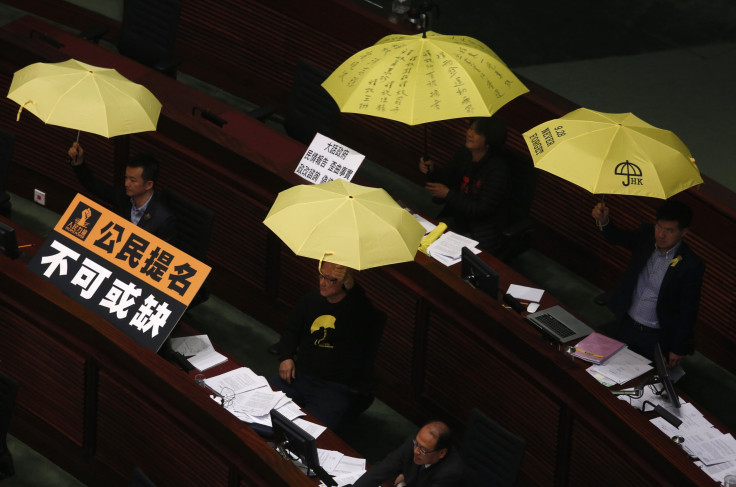Hong Kong Lawmakers Protest Elections, Embrace Umbrella Revolution As Government Vows To Follow Beijing Plan

Pro-democracy legislators walked out of an elections meeting Wednesday in Hong Kong as government leaders vowed to stick with Beijing's plan to oversee the city's contest for its new chief executive in 2017. The protest came after months of street demonstrations that saw youth activists demand open elections.
At the start of the meeting, lawmakers supporting the pro-democracy movement called for free elections and raised yellow umbrellas, a symbol of the monthslong demonstrations. The minority caucus then walked out. "The walkout is to signify our protest against this government that's been cheating Hong Kong people on the political reform front," said legislator Claudia Mo, who joined the protest, according to the Associated Press. "We tried for years, democrats in general to try to appease Beijing and play it soft and try to be negotiable and it's all to no avail and now we know we need to stand firm for our younger generation."
Mainland China initially vowed to allow Hong Kong to hold open elections in a 1997 deal with Britain that created a "one country, two systems" policy. But Beijing announced last year it would instead screen all candidates ahead of the first proposed free election in 2017. The decision sparked protests throughout Hong Kong's commerce centers.
Chief Secretary Carrie Lam said Wednesday the government respected free speech, but added, “If people ignore legal and political realities or even resort to disrupting public peace and undermining other people’s rights, the so-called ‘pursuit of the ideal’ or ‘fight to justice’ is just empty talk,” the AP reported.
Lam said the chief executive election must continue as planned, with Beijing overseeing the election nominating process. Otherwise, electoral reform could be postponed until 2022, she said, according to Reuters.
"Constitutional development must be built on the basis of the Basic Law and the decision of [China's] NPCSC [National People's Congress Standing Committee], otherwise it would only be futile and impractical and the aim of universal suffrage for the CE [chief executive] election would only become a 'castle in the air'," Lam said.
© Copyright IBTimes 2024. All rights reserved.












